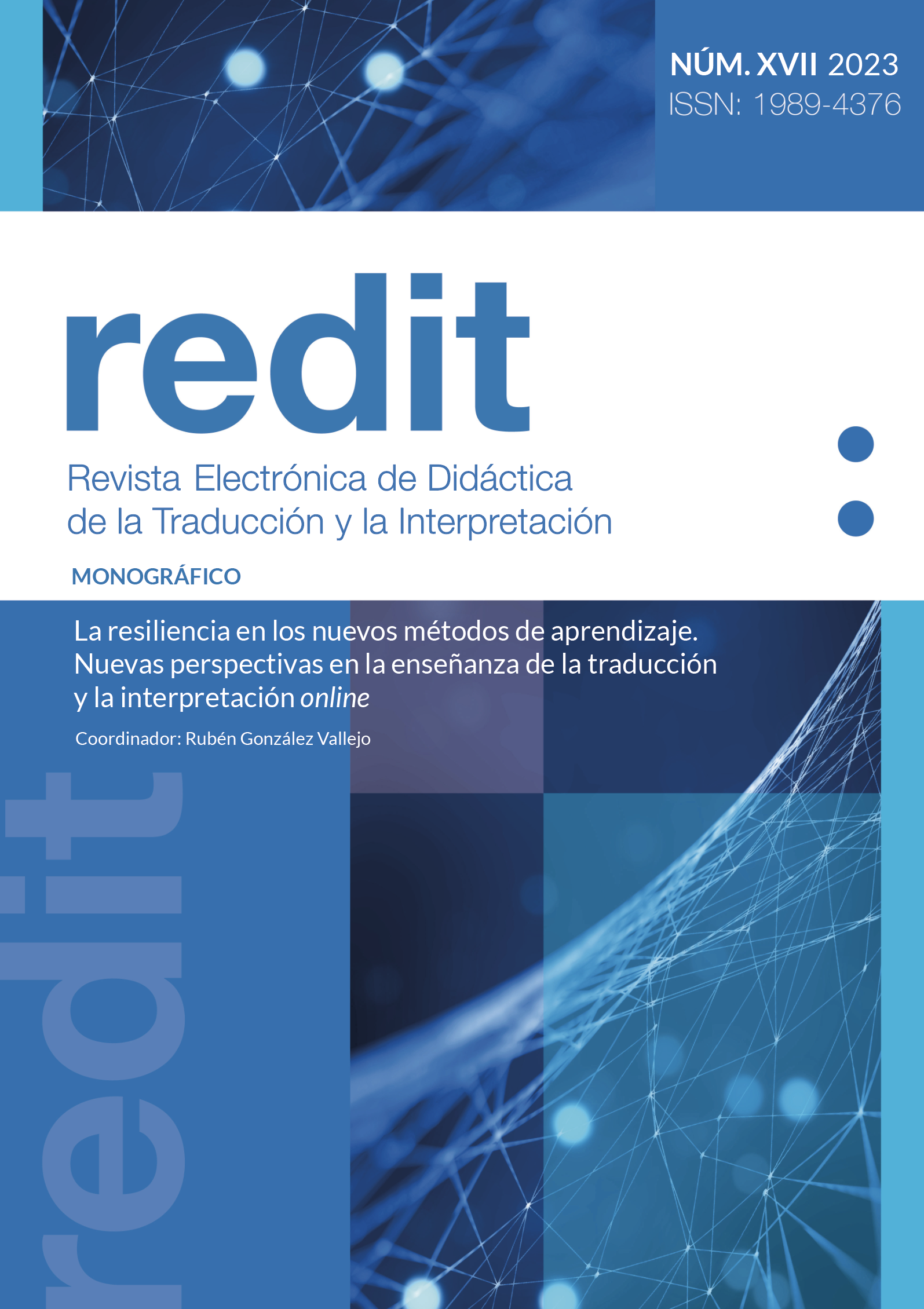FOIL (Formación Online para las Industrias de la Lengua - Online Training for the Language Industries): translation training in the digital age
DOI:
https://doi.org/10.24310/redit.17.2023.18294Keywords:
language industries, translation, FOIL, online training, reskillingAbstract
The continued growth of the language industries has boosted the emergence of scattered training solutions in the field of Translation, unveiling the clear gap between the needs of industry and the solutions provided by academia. The FOIL project (Formación Online para las Industrias del Lenguaje - Online Training for the Language Industries) aims to develop an innovative, online training model that takes advantage of current technological developments to offer new, industry-oriented, research-based qualifications. The main objective of the training model, integrated by five independent but complementary modules, is to meet needs of the language industries, lowering barriers for those who cannot access current qualification opportunities either for personal, economic, geographic, or any other reason, or looking for reskilling opportunities.
Downloads
Metrics
References
Álvarez Álvarez, Susana y Ortego Antón, María Teresa (Eds). 2020. Perfiles estratégicos de traductores e intérpretes. La transmisión de la información experta multilingüe en la sociedad del conocimiento del siglo XXI. Granada: Comares.
Álvarez-Álvarez, Susana y Arnáiz-Uzquiza, Verónica. 2017. Translation and interpreting graduates under construction: do Spanish translation and interpreting studies curricula answer the challenges of employability? The Interpreter and translator trainer, 11(2-3), 139-159. https://doi.org/10.1080/1750399X.2017.1344812
Angelone, Erik, Ehrensberger-Dow, Maureen y Gary Massey (Eds.). 2020. The Bloomsbury companion to language industry studies. Bloomsbury Academic Press.
Arevalillo-Doval, Juan José. 2020. El perfil del traductor especializado desde los ámbitos profesional y académico: retos, expectativas y el Proyecto e-transfair. En Álvarez-Álvarez, Susana y Ortego-Antón, María Teresa (Eds.) Perfiles estratégicos de traductores e intérpretes. La transmisión de la información experta multilingüe en la Sociedad del conocimiento del siglo XXI. Granada: Editorial Comares, 5-27.
D’Souza, Manoj Joseph y Rodrigues, Paul. 2015. Extreme pedagogy: An agile teaching-learning methodology for engineering education. Indian Journal of Science and Technology 8(9), 828. DOI: 10.17485/ijst/2015/v8i9/53274
Ehrensberger-Dow, Maureen y Jääskeläinen, Riitta. 2018. Ergonomics of translation: methodological, practical, and educational implications. En H. V. Dam, M.N. Brøgger and K. Korning Zethsen (Eds.), Moving boundaries in translation studies. Oxon: Routledge, 132-150.
EUATC. 2021. European Language Industry Survey (ELIS). https://euatc.org/elis2021/
Galán-Mañas, Anabel. 2017. Programa para la mejora de la empleabilidad de los egresados en traducción e interpretación. Un estudio de caso. Revista Conexão Letras 12(17), 153-171. https://seer.ufrgs.br/conexaoletras/article/view/75624
Kenny, Dorothy. 2017. Human Issues in Translation Technology. London and New York: Routledge.
Kiraly, Donald. 2015. Occasioning translator competence: Moving beyond social constructivism toward a postmodern alternative to instructionism. Translation and Interpreting Studies. The Journal of the American Translation and Interpreting Studies Association, 10(1), 8-32. https://doi.org/10.1075/tis.10.1.02kir
Marshman, Elisabeth. 2014. Taking Control: Language Professionals and Their Perception of Control when Using Language Technologies. Meta, 59 (2), 380-405. https://doi.org/10.7202/1027481ar
Mazzei, Cristiano e Ibrahim Aibo, Laurence Jay-Rayon. 2022. The Routledge Guide to Teaching Translation and Interpreting Online. London y Nueva York: Routledge.
Nimdzi. 2022. The 2022 Nimdzi 100: The Ranking of Top 100 Largest Language Service Providers in the World. https://www.nimdzi.com/nimdzi-100-top-lsp/
O’Hagan, Minako. 2019. The Routledge Handbook of Translation and Technology. London y Nueva York: Routledge.
Rico, Celia; Sánchez Gijón, Pilar y Torres-Hostench, Olga. 2018. The Challenge of Machine Translation Post-editing: An Academic Perspective. En G. Corpas Pastor and I. Durán Muñoz (Eds.), Trends in e-Tools and Resources for Translators and Interpreters. Leiden: Brill, 203-218.
Rodríguez de Céspedes, Begoña. 2018. Mind the gap: Language Service Providers’ perceptions of the technological training of professional translators. En E. Postigo (Ed). Nuevas tecnologías, procesos cognitivos y estrategias para la optimización de las competencias del traductor e intérprete. Berlin: Frank and Timme, 143-161.
Rodríguez de Céspedes, Begoña. 2017. Addressing employability and Enterprise responsibilities in the translation curriculum. The Translator and Interpreter Trainer. Employability in the Translation and Interpreting Curriculum, 11(2-3), 107-122. https://doi.org/10.1080/1750399X.2017.1344816
Sin-Wai, Chan. (Ed.) 2015. The Routledge Encyclopaedia of Translation Technology. London y Nueva York: Routledge.
Downloads
Published
How to Cite
Issue
Section
License

Este obra está bajo una licencia de Creative Commons Reconocimiento-NoComercial-SinObraDerivada 4.0 Internacional.






29.png)
